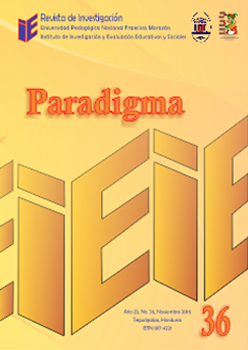Emerging elements in the new configuration of the substantive functions of the university
DOI:
https://doi.org/10.5377/paradigma.v23i36.6488Keywords:
Teaching, research, social engagement, transdisciplinarity, integration, heuristics, academic culture, globalization, and permanent innovationAbstract
This article presents a series of reflections about the resignification of the substantial functions of the university: teaching, research, and engagement with society, taking into account some of the tendencies and characteristics of the society on the 21stcentury, which leads us to conceive the university activity as a multi-contextualized and changing task. In this sense, it is said that the different work forms that are developed in the scenarios of its competence, must be established on the basis of criteria such as plurality, flexibility, integration and permanent innovation.
In addition, it submits that the classroom frameworks and the self determination of the academic enclosures that in the past constituted sources and mechanisms for the diffusion of authority rules, through which they exercised the knowledge monopoly, they have entered into the inevitable decadence, conforming the new banality that succumbs before the transforming power of post-modern cognition and the irreverent activity of scientific research.
On the final lines of the article, three proposals are presented for the new configuration of the university substantial functions: the promotion of interdisciplinary work on the different dimensions of the academic culture development and transformation, the bioethics as transdisciplinary workspace, and the strengthening of the heuristic relationship between teaching, research, and the engagement with society.
Downloads
890
Downloads
Published
How to Cite
Issue
Section
License
Transfer of Copyright
- The author, when sending the work, states that it is his will to give the Universidad Pedagógica Nacional Francisco Morazán the patrimonial rights that correspond to him as the author of his work.
- The rights here assigned include all economic rights (Reproduction, transformation, public communication and distribution) and are given without limitation in terms of territory; This Assignment is given for the entire duration term established in the current legislation in Honduras.
- The cession of the aforementioned rights does not imply the cession of moral rights over it, because in accordance with the provisions of the Copyright and Related Rights Law, Chapter II, of the Moral Rights, Article 34, Article 25 , these rights are inalienable, imprescriptible, indefeasible and inalienable.
- The research work or document must be original and have been done without violating or usurping rights of third parties, therefore, the work is exclusively authored and owns the same.
- In the case of any claim or action by a third party, as to copyright on the work in question, the author must assume full responsibility for the rights assigned.
- Upon completion of the Rights Assignment Form, the author states that the work has not been published in another way, that the rights on the work have not been assigned and that no encumbrance or limitation on their use or use is imposed on them.





